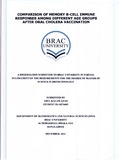Comparison of memory B-Cell immune responses among different age groups after oral cholera vaccination

View/
Date
2011-12Publisher
BRAC UniversityAuthor
Azad, Abul KalamMetadata
Show full item recordAbstract
Infection with Nbrio cholerae Olcauses dehydrating diarrhea, although it is now treatable
disease with low case-fatality in settings with appropriate medical care . However, cholera
continues to impose considerable mortality in the world ' s most impoverished populations.
Natural infections usually give medium range immunity and it has been hypothesized that
the protective immunity to V cholerae infection may be mediated by anamnestic memory
B-cell responses . An oral cholera vaccine , Dukoral is a killed inactivated vaccine which
provides protection against the disease through the development of antigen specific memory
B-cells . This study was carried out to compare memory B-cells and serological responses in
Bangladeshi healthy young children (2-5 years, n=20), older children (6-17 years , n=20) and
adults ( 18-45 years, n=32) after oral cholera vaccination . These responses to cholera
antigens including lipopolysaccharide (LPS) and cholera toxin B subunit (CtxB) were
assessed prior to immunization (day 0 ) and then on different study days using polyclonal
stimulation of peripheral blood mononuclear cells (PBMC) followed by an enzyme linked
immuno spot assay (ELISPOT) procedure. Adult vaccinees developed cholera toxin CT -
specific IgA and IgG memory B cell responses by day 30 which remained detectable
through at least for 90 days . In case of both younger and older child vaccinees , there was no
significant level of CT -specific IgG memory B-cell responses, but the responses tended to
be higher at day 30 (P=0.0625) post immunization. However, there was no significant
elevation of the magnitude of LPS -specific IgA or IgG memory B-cell responses in any age
group of vaccinees . Plasma antibody responses were measured by using the enzyme linked
immunosorbant assay (ELISA) procedure. Adult vaccinees developed plasma CT-specific
IgA and IgG for a longer duration of 3 months and 6 months, respectively, whereas these
responses were relatively short-lived for the child vaccinees. The response to vaccination
was also assessed by using the vibriocidal antibody assay. It was found that adult vaccinees
developed high vibriocidal responses throughout the study period of 6 months, whereas
these responses persisted for one month in both groups of child vaccinees. These results
suggest that adult vacinees confer relatively long-term protection after oral cholera
vaccination compared to young and older child vaccinees.
